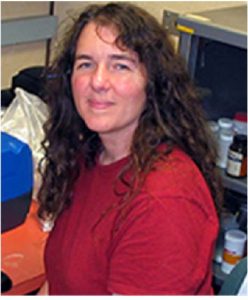 Outbreak Sympoisum: Keynote Speaker. Dr Karen Garrett, Plant Pathology, Department, Institute for Sustainable Food Systems, and Emerging Pathogens Institute, University of Florida, Gainesville
Outbreak Sympoisum: Keynote Speaker. Dr Karen Garrett, Plant Pathology, Department, Institute for Sustainable Food Systems, and Emerging Pathogens Institute, University of Florida, Gainesville
Smart surveillance and mitigation for plant diseases that threaten food security Resource limitations and economic constraints are always a factor for managing plant diseases. This talk will address three aspects of strategy formulation. (1) Effective altruism offers an ethical lens on research priorities, including identification of key stakeholders, pathosystems, and topics to provide the greatest possible benefit. This framework can also help to address the potential ‘tragedy of the microbiome commons’ in which the decisions of many disease managers combine to determine (or undermine) the success of regional management. (2) System models and scenario analysis can also support strategies for regional disease management. For example, seed systems are a key factor for the spread of improved disease-resistant varieties through disease-free planting material but are also a risk factor for the spread of disease. A compromise between these two considerations is needed, and systems analysis can help to formulate strategies for a good compromise. (3) Integrating disease surveillance in a global system is proposed and offers many advantages for better management within and among countries. A global system can support both improved information spread and model use, as well as capacity building for epidemiology and risk modeling. More information about our work on these components is available at garrettlab.com.
Emerging Threats Colloquium, Spring 2018. Synopsis: We explored how emerging pathogens and pests threaten global food security in the 21st century and addressed the challenge of detecting, predicting and controlling these pathogens and pests. The course featured invited speakers engaged in topics related to new biotechnology, detection in the field, molecular epidemiology, transgenics and landscape-level controls.
Instructors: David Rasmussen (drasmus@ncsu.edu), Jean Ristaino (jbr@ncsu.edu), Dorith Rotenberg (drotenb@ncsu.edu), Qingshan Wei (qwei@ncsu.edu), Anna Whitfield (awhitfi@ncsu.edu)
| Date | Speaker | Topic |
| Jan 10th | Welcome and introductions | |
| Jan 17th | Jason Delborne (NCSU) | Forest Biotechnology and Public Values |
| Jan 24th | Discussion of Jason Delborne’s work | |
| Jan 31st | Trino Ascencio | Viral Diseases of Cassava |
| Feb 7th | Discussion of Dr Ascencio’s work | |
| Feb 14th | Erica Goss (Univ of Florida) | Phylogeography of plant pathogens |
| Feb 21st | Discussion of Erica Goss’ work | |
| Feb 28th | Chris Jones (NCSU) | Spatial epidemiology |
| Mar 7 | Discussion of Chris Jones’ work | |
| Mar 14th | Spring Break | |
| Mar 21st | Sue Tolin (Virginia Poly.) | Virus disease management |
| Mar 28th | Discussion of Sue Tolin’s work | |
| Apr 4th | Liang Dong (ISU) | Remote sensing/detection of pathogens |
| Apr 11th | Discussion of Liang Dong’s work | |
| Apr 18th | Dan Bebber (Univ of Exeter) | Climate Change Effects on Emerging Crop Pests and Pathogens |
| Apr 25th | Discussion of Dan Bebber’s work |
Fall and Spring 2016-2017
Aug, 26 Biotechnology and Bioterrorism: Reconceptualizing Bioweapons Threats –
Dr. Kathleen Vogel, Director Science Technology and Society Program, NC State
Oct 14 Geospatial Analytics of Plant Disease Outbreaks
Dr. Ross Meentemeyer, Director Center for Geopspatial Analyticss, NC State
Nov 11 Cassava Viruses : A Threat to Global Food Security
Dr. Linda Hanley-Bowdoin, William Neal Reynolds Professor Plant and Microbial Biology, NC State
Jan 27 Industry Jobs and Beyond, Dr. Allison Talley, Syngenta Corporation
Feb 17 Towards Understanding Phytophthora , Dr. William Fry, Cornell University
March 2 Value Chain Research Teams for Aflatoxin Management: Trying to See the Big Picture, Dr. Rick Brandenburg, Dept Entomology, NC State
March 23-24, 2017 Global Food Security Symposium

